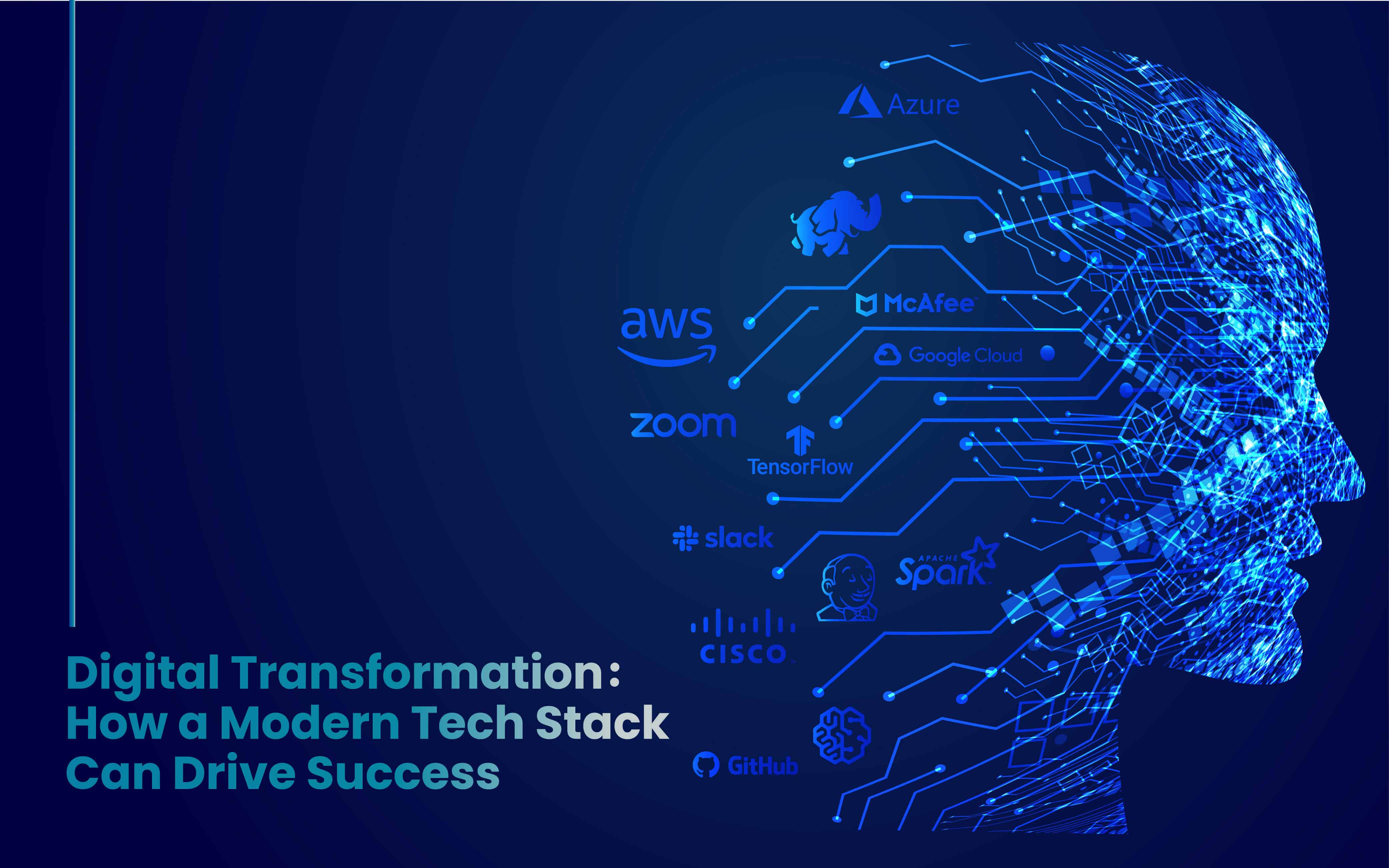Blogs
To know about all things Digitisation and Innovation read our blogs here.
Digital Transformation
Digital Transformation: How a Modern Tech Stack Can Drive Success?
SID Global Solutions
2 March 2023

Digital transformation is the process of using digital technologies to fundamentally change how organizations operate and deliver value to customers. To achieve digital transformation, organizations need to build a modern tech stack that includes a combination of tools, technologies, and platforms. In this article, we will explore the essential tools required for digital transformation and how they can drive success.
- Cloud Computing
- Artificial Intelligence (AI) and Machine Learning (ML)
- Internet of Things (IoT)
- Big Data and Analytics
- Cybersecurity
- Collaboration and Communication Tools
- DevOps
1. Cloud Computing
Cloud computing is a foundational technology for digital transformation. It allows organizations to store and access data, applications, and services over the internet rather than relying on physical servers or infrastructure. Cloud computing provides flexibility, scalability, and cost savings, making it an essential tool for organizations of all sizes.
There are three main types of cloud computing: Infrastructure as a Service (IaaS), Platform as a Service (PaaS), and Software as a Service (SaaS). IaaS provides the infrastructure needed to host applications and services, such as servers and storage. PaaS provides a platform for developers to build and deploy applications. SaaS provides software applications that are delivered over the internet.
Also Read: How to Use Kubernetes to Automate Your DevOps Pipeline?
Some of the popular cloud computing platforms include Amazon Web Services (AWS), Microsoft Azure, and Google Cloud Platform.
Amazon Web Services (AWS): Amazon Web Services (AWS) is a cloud computing platform that provides a wide range of services, including computing, storage, databases, analytics, networking, machine learning, and security. AWS allows organizations to quickly and easily access computing resources on demand, without the need for on-premises infrastructure. With its scalable and flexible infrastructure, AWS can help organizations of all sizes and industries to innovate faster, reduce costs, and improve efficiency.
AWS has a vast global network of data centers, which ensures high availability and reliability of services. AWS also provides a range of tools and services that enable organizations to build, deploy, and manage applications and services at scale. With its focus on innovation and customer obsession, AWS is a popular choice for organizations that want to embark on a digital transformation journey and build a modern tech stack.
Microsoft Azure: Microsoft Azure is a cloud computing platform that provides a range of services, including computing, storage, databases, analytics, networking, machine learning, and security. Azure enables organizations to quickly and easily access computing resources on demand, without the need for on-premises infrastructure. With its scalable and flexible infrastructure, Azure can help organizations of all sizes and industries to innovate faster, reduce costs, and improve efficiency.
Azure has a global network of data centers, which ensures high availability and reliability of services. Azure also provides a range of tools and services that enable organizations to build, deploy, and manage applications and services at scale. With its focus on enterprise-grade security and compliance, Azure is a popular choice for organizations that need to meet strict regulatory requirements. Azure also provides hybrid cloud capabilities, which enable organizations to seamlessly integrate on-premises and cloud environments. With its strong ecosystem of partners and developers, Azure is well-positioned to support organizations on their digital transformation journey.
Google Cloud Platform (GCP): Google Cloud Platform (GCP) is a cloud computing platform that provides a range of services, including computing, storage, databases, analytics, networking, machine learning, and security. GCP enables organizations to quickly and easily access computing resources on demand, without the need for on-premises infrastructure. With its scalable and flexible infrastructure, GCP can help organizations of all sizes and industries to innovate faster, reduce costs, and improve efficiency.
GCP has a global network of data centers, which ensures high availability and reliability of services. GCP also provides a range of tools and services that enable organizations to build, deploy, and manage applications and services at scale. With its focus on innovation and data-driven insights, GCP is a popular choice for organizations that want to leverage advanced analytics and machine learning capabilities. GCP also provides strong security and compliance features, including encryption and access controls, which are essential for organizations that handle sensitive data. With its strong focus on open source and developer-friendly tools, GCP is well-positioned to support organizations on their digital transformation journey.
Also Read: Three Pillars of Digital Transformation: Governance, Culture, and Change Management
2. Artificial Intelligence (AI) and Machine Learning (ML)
Artificial Intelligence and Machine Learning are becoming increasingly important tools for digital transformation. They enable organizations to automate processes, make predictions, and gain insights from data. AI and ML can be used in a variety of applications, such as chatbots, natural language processing, image recognition, and predictive analytics.
There are many AI and ML platforms available, including TensorFlow, Microsoft Azure Machine Learning, and Amazon SageMaker.
TensorFlow: TensorFlow is an open-source machine learning platform that enables organizations to build and deploy machine learning models at scale. TensorFlow provides a range of tools and libraries that enable organizations to develop and train machine learning models using a variety of techniques, including deep learning, neural networks, and reinforcement learning. TensorFlow is designed to be scalable and can run on a variety of platforms, including cloud-based environments and mobile devices.
TensorFlow provides a flexible and powerful platform for building machine learning models that can be used for a wide range of applications, including image and speech recognition, natural language processing, and predictive analytics. With its focus on open source and community-driven development, TensorFlow is a popular choice for organizations that want to leverage the latest advances in machine learning technology. TensorFlow is also supported by a large and active developer community, which provides a range of resources, including tutorials, sample code, and support forums. With its powerful features and broad support, TensorFlow is an essential tool for organizations that want to build a modern tech stack and drive digital transformation.
Microsoft Azure Machine Learning: Microsoft Azure Machine Learning is a cloud-based platform that enables organizations to build, train, and deploy machine learning models at scale. Azure Machine Learning provides a range of tools and services that enable organizations to develop and deploy machine learning models using a variety of techniques, including deep learning, neural networks, and reinforcement learning. Azure Machine Learning also provides a range of features for managing data and training models, including automated machine learning, data labeling, and model interpretation.
With its focus on enterprise-grade security and compliance, Azure Machine Learning is a popular choice for organizations that need to meet strict regulatory requirements. Azure Machine Learning also provides seamless integration with other Azure services, including Azure Cognitive Services and Azure IoT, enabling organizations to build end-to-end machine learning solutions. With its strong focus on enterprise-grade security and compliance, Azure Machine Learning is an essential tool for organizations that want to build a modern tech stack and drive digital transformation.
Amazon SageMaker: Amazon SageMaker is a cloud-based machine learning platform that enables organizations to build, train, and deploy machine learning models at scale. SageMaker provides a range of tools and services that enable organizations to develop and deploy machine learning models using a variety of techniques, including deep learning, neural networks, and reinforcement learning. SageMaker also provides a range of features for managing data and training models, including data labeling, hyperparameter optimization, and model interpretation.
With its focus on scalability and cost-efficiency, SageMaker is a popular choice for organizations that want to build machine learning models without the need for significant infrastructure investments. SageMaker also provides seamless integration with other AWS services, including AWS Lambda and Amazon S3, enabling organizations to build end-to-end machine learning solutions. With its focus on innovation and ease of use, SageMaker is an essential tool for organizations that want to build a modern tech stack and drive digital transformation.
Also Read: How to Implement Sustainable Digital Transformation in Public Services
3. Internet of Things (IoT)
IoT is the network of physical devices, vehicles, home appliances, and other items embedded with sensors, software, and network connectivity. IoT enables organizations to collect and analyze data from a variety of sources, such as sensors, wearables, and connected devices.
IoT is being used in many industries, such as manufacturing, healthcare, and transportation. IoT platforms include Microsoft Azure IoT, AWS IoT, and Google Cloud IoT.
Microsoft Azure IoT: Microsoft Azure IoT is a cloud-based platform that enables organizations to build and deploy Internet of Things (IoT) solutions at scale. Azure IoT provides a range of tools and services that enable organizations to collect, analyze, and act on data generated by IoT devices. Azure IoT includes a range of services, including Azure IoT Hub, Azure IoT Central, and Azure Stream Analytics, that enable organizations to securely connect, manage, and monitor IoT devices at scale.
Azure IoT also provides a range of features for managing data and developing custom IoT solutions, including device management, data processing, and machine learning. With its focus on enterprise-grade security and compliance, Azure IoT is a popular choice for organizations that need to meet strict regulatory requirements. Azure IoT also provides seamless integration with other Azure services, including Azure Functions and Azure Event Grid, enabling organizations to build end-to-end IoT solutions. With its focus on innovation and enterprise-grade features, Azure IoT is an essential tool for organizations that want to build a modern tech stack and drive digital transformation.
AWS IoT: AWS IoT is a cloud-based platform that enables organizations to build and deploy Internet of Things (IoT) solutions at scale. AWS IoT provides a range of tools and services that enable organizations to connect, manage, and monitor IoT devices securely. AWS IoT includes a range of services, including AWS IoT Core, AWS IoT Device Management, and AWS IoT Analytics, that enable organizations to securely manage and process IoT data at scale. AWS IoT also provides a range of features for developing custom IoT solutions, including device management, security, and analytics.
With its focus on scalability and cost-efficiency, AWS IoT is a popular choice for organizations that want to build IoT solutions without the need for significant infrastructure investments. AWS IoT also provides seamless integration with other AWS services, including AWS Lambda and Amazon S3, enabling organizations to build end-to-end IoT solutions. With its focus on innovation and ease of use, AWS IoT is an essential tool for organizations that want to build a modern tech stack and drive digital transformation.
Google Cloud IoT: Google Cloud IoT is a cloud-based platform that enables organizations to build and deploy Internet of Things (IoT) solutions at scale. Google Cloud IoT provides a range of tools and services that enable organizations to connect, manage, and monitor IoT devices securely. Google Cloud IoT includes a range of services, including Google Cloud IoT Core, Google Cloud IoT Edge, and Google Cloud IoT Dataflow, that enable organizations to securely manage and process IoT data at scale.
Google Cloud IoT also provides a range of features for developing custom IoT solutions, including device management, security, and analytics. With its focus on scalability and interoperability, Google Cloud IoT is a popular choice for organizations that want to build IoT solutions that can integrate with other cloud platforms and services. Google Cloud IoT also provides seamless integration with other Google Cloud services, including Google Cloud Functions and Google Cloud Storage, enabling organizations to build end-to-end IoT solutions. With its focus on innovation and interoperability, Google Cloud IoT is an essential tool for organizations that want to build a modern tech stack and drive digital transformation.
Also Read: Three Waves of Digital Transformation: What You Need to Know to Stay Ahead
4. Big Data and Analytics
Big data and analytics are essential for digital transformation. They enable organizations to collect, store, and analyze vast amounts of data to gain insights and make better decisions. Big data and analytics can be used in a variety of applications, such as customer analytics, predictive maintenance, and supply chain optimization.
Some of the popular big data and analytics platforms include Apache Hadoop, Apache Spark, and Apache Kafka.
Apache Hadoop: Apache Hadoop is an open-source software framework that enables organizations to store and process large volumes of data across distributed computing clusters. Hadoop includes a range of tools and services that enable organizations to process, store, and analyze big data in a cost-effective and scalable way. Hadoop includes two core components: Hadoop Distributed File System (HDFS) and Hadoop MapReduce. HDFS enables organizations to store and manage large volumes of data across distributed computing clusters, while Hadoop MapReduce enables organizations to process and analyze this data in parallel across multiple nodes.
Hadoop also includes a range of other tools and services, including Apache Hive, Apache Pig, and Apache Spark, that enable organizations to process and analyze data in a variety of ways. With its focus on scalability and cost-efficiency, Hadoop is a popular choice for organizations that need to process and analyze large volumes of data. Hadoop also provides seamless integration with other Apache projects, including Apache Cassandra and Apache Kafka, enabling organizations to build end-to-end big data solutions. With its focus on innovation and scalability, Hadoop is an essential tool for organizations that want to build a modern tech stack and drive digital transformation.
Apache Spark: Apache Spark is an open-source distributed computing system that enables organizations to process and analyze large volumes of data in real-time. Spark includes a range of tools and services that enable organizations to process and analyze data across distributed computing clusters, making it possible to handle large volumes of data quickly and efficiently. Spark includes a range of core components, including Spark Core, Spark SQL, Spark Streaming, and MLlib, that enable organizations to process and analyze data in a variety of ways.
Spark is also designed to work seamlessly with other big data tools and services, including Hadoop, Cassandra, and Kafka, making it a popular choice for organizations that need to process and analyze large volumes of data across multiple platforms. With its focus on real-time processing and scalability, Spark is an essential tool for organizations that want to build a modern tech stack and drive digital transformation. Spark is used by a wide range of organizations, including financial services, healthcare, and retail companies, to process and analyze data in real-time and gain insights that help them make better business decisions. With its focus on innovation and real-time processing, Spark is an essential tool for any organization that wants to build a modern tech stack and stay ahead of the competition.
Apache Kafka: Apache Kafka is an open-source distributed streaming platform that enables organizations to process and analyze large volumes of data in real-time. Kafka includes a range of tools and services that enable organizations to process and analyze data across distributed computing clusters, making it possible to handle large volumes of data quickly and efficiently. Kafka includes a range of core components, including Kafka Connect, Kafka Streams, and KSQL, that enable organizations to process and analyze data in a variety of ways.
Kafka is also designed to work seamlessly with other big data tools and services, including Hadoop, Spark, and Cassandra, making it a popular choice for organizations that need to process and analyze large volumes of data across multiple platforms. With its focus on real-time processing and scalability, Kafka is an essential tool for organizations that want to build a modern tech stack and drive digital transformation. Kafka is used by a wide range of organizations, including financial services, healthcare, and retail companies, to process and analyze data in real-time and gain insights that help them make better business decisions. With its focus on innovation and real-time processing, Kafka is an essential tool for any organization that wants to build a modern tech stack and stay ahead of the competition.
Also Read: Challenges and Solutions for Implementing Interoperable Multi-Cloud
5. Cybersecurity
Cybersecurity is critical for digital transformation. As organizations rely more on digital technologies, they become more vulnerable to cyberattacks. Cybersecurity tools include firewalls, intrusion detection systems, and security information and event management (SIEM) platforms.
Some of the popular cybersecurity platforms include IBM Security, McAfee, and Cisco.
IBM Security: IBM Security is a suite of security products and services that enable organizations to protect themselves against cyber threats and security breaches. IBM Security includes a range of tools and services that enable organizations to monitor, detect, and respond to security incidents in real-time, making it possible to identify and mitigate potential security risks before they become major issues. IBM Security includes a range of core components, including IBM QRadar, IBM Resilient, and IBM X-Force, that enable organizations to protect their networks, endpoints, and data from a wide range of threats, including malware, phishing attacks, and advanced persistent threats.
IBM Security is also designed to work seamlessly with other security tools and services, making it a popular choice for organizations that need to protect their digital assets against a wide range of security threats. With its focus on innovation and real-time monitoring, IBM Security is an essential tool for organizations that want to build a modern tech stack and drive digital transformation while maintaining the highest levels of security. IBM Security is used by a wide range of organizations, including financial services, healthcare, and government agencies, to protect their digital assets and ensure the safety of their customers and stakeholders.
McAfee: McAfee is a leading provider of cybersecurity solutions that enable organizations to protect themselves against a wide range of digital threats. McAfee’s suite of products and services includes antivirus and anti-malware software, firewalls, endpoint protection, and data encryption, among others. McAfee is designed to help organizations protect their networks, endpoints, and data from cyber attacks and other digital threats. The company’s core products, including McAfee Endpoint Security, McAfee Total Protection, and McAfee MVISION, provide comprehensive protection against a wide range of cyber threats, including malware, phishing attacks, ransomware, and advanced persistent threats.
McAfee is also known for its innovative cloud-based security solutions, which enable organizations to monitor their networks and endpoints in real-time, making it possible to identify and mitigate potential security risks before they become major issues. With its focus on innovation and real-time monitoring, McAfee is an essential tool for any organization that wants to build a modern tech stack and drive digital transformation while maintaining the highest levels of security. McAfee is used by a wide range of organizations, including financial services, healthcare, and government agencies, to protect their digital assets and ensure the safety of their customers and stakeholders.
Cisco: Cisco is a leading provider of networking and cybersecurity solutions that enable organizations to build a modern tech stack and drive digital transformation. Cisco’s suite of products and services includes routers, switches, firewalls, and endpoint protection, among others. Cisco’s solutions are designed to help organizations protect their networks, endpoints, and data from cyber threats, while also providing the tools and infrastructure needed to build and manage complex IT systems. Cisco’s core products, including Cisco Secure Firewall, Cisco Identity Services Engine, and Cisco Advanced Malware Protection, provide comprehensive protection against a wide range of cyber threats, including malware, phishing attacks, and advanced persistent threats.
Cisco is also known for its innovative cloud-based security solutions, which enable organizations to monitor their networks and endpoints in real-time, making it possible to identify and mitigate potential security risks before they become major issues. With its focus on innovation and real-time monitoring, Cisco is an essential tool for any organization that wants to build a modern tech stack and drive digital transformation while maintaining the highest levels of security. Cisco is used by a wide range of organizations, including financial services, healthcare, and government agencies, to protect their digital assets and ensure the safety of their customers and stakeholders.
Also Read: The Future of Healthcare: How AI is Changing the Landscape?
6. Collaboration and Communication Tools
Collaboration and communication tools are essential for digital transformation. They enable teams to work together efficiently and effectively, regardless of location. Collaboration and communication tools include instant messaging, video conferencing, and project management platforms.
Some of the popular collaboration and communication platforms include Microsoft Teams, Slack, and Zoom.
Microsoft Teams: Microsoft Teams is a collaboration platform that enables teams to work together in real-time, regardless of their location. Teams provides a central hub for communication and collaboration, with features like chat, video conferencing, file sharing, and project management tools. Teams is designed to help organizations build a modern tech stack that is focused on collaboration and productivity.
With Teams, teams can work together on projects and share information in real-time, regardless of their location. Teams also integrates seamlessly with other Microsoft products, like Office 365 and SharePoint, making it possible to collaborate on documents and other files in real-time. Teams is a powerful tool for driving digital transformation, as it enables organizations to build more efficient and effective teams, while also reducing the time and cost associated with traditional collaboration methods. Teams is used by a wide range of organizations, from small businesses to large enterprises, to drive digital transformation and build more effective teams.
Slack: Slack is a popular collaboration platform that enables teams to communicate and collaborate in real-time. Slack’s core features include messaging, file sharing, video conferencing, and project management tools, all of which are designed to help teams work together more efficiently. Slack is known for its intuitive interface, which makes it easy for users to collaborate and stay connected, regardless of their location. Slack is also highly customizable, with a wide range of integrations and third-party apps that can be added to the platform to extend its functionality.
Slack is a key tool for organizations that are focused on driving digital transformation, as it enables teams to collaborate more effectively and work together in real-time, regardless of their location. Slack is used by a wide range of organizations, from startups to Fortune 500 companies, to improve productivity, reduce communication overhead, and drive digital transformation.
Zoom: Zoom is a video conferencing platform that has become increasingly popular in recent years, particularly due to the rise of remote work and the need for virtual meetings. Zoom provides a range of features, including video and audio conferencing, screen sharing, and chat functions, all of which are designed to enable remote teams to work together more effectively. Zoom’s platform is easy to use, with a simple interface that enables users to start and join meetings quickly and easily.
The platform also provides high-quality video and audio, making it a popular choice for virtual team meetings and webinars. Zoom is a powerful tool for organizations that are focused on driving digital transformation, as it enables teams to collaborate and communicate more effectively, regardless of their location. Zoom is used by a wide range of organizations, from small businesses to large enterprises, to enable remote work, reduce travel costs, and drive digital transformation.
Also Read: How Digital Transformation is Shaping the Future of Customer Experience?
7. DevOps
DevOps is a set of practices that combines software development and IT operations. DevOps enables organizations to deliver applications and services faster and more reliably. DevOps tools include source code management, continuous integration and delivery, and containerization platforms.
Some of the popular DevOps platforms include GitHub, Jenkins, and Docker.
GitHub: GitHub is a web-based platform that is primarily used for version control and collaborative software development. The platform enables developers to work together on projects in real-time, regardless of their location. GitHub provides a range of features, including code management, bug tracking, and project management tools, all of which are designed to help developers collaborate more effectively. GitHub’s platform is highly customizable, with a wide range of integrations and plugins available that enable developers to extend the functionality of the platform to meet their specific needs.
GitHub is a powerful tool for organizations that are focused on driving digital transformation, as it enables developers to work together more effectively, reduce the time and cost associated with traditional software development methods, and improve code quality. GitHub is used by a wide range of organizations, from small startups to large enterprises, to drive digital transformation and improve their software development capabilities.
Jenkins: Jenkins is an open-source automation server that is primarily used for continuous integration and continuous delivery (CI/CD) of software. Jenkins enables developers to automate the process of building, testing, and deploying software, making it easier to release new features and updates to end-users. Jenkins provides a range of features, including build automation, testing automation, and deployment automation tools, all of which are designed to help developers automate the software development process.
Jenkins is highly customizable, with a wide range of plugins and integrations available that enable developers to extend the functionality of the platform to meet their specific needs. Jenkins is a powerful tool for organizations that are focused on driving digital transformation, as it enables developers to reduce the time and cost associated with traditional software development methods, and improve the quality of their software. Jenkins is used by a wide range of organizations, from small startups to large enterprises, to automate their software development process and drive digital transformation.
Docker: Docker is an open-source platform that enables developers to create, deploy, and run applications in containers. Docker containers provide a lightweight and portable way to package applications and their dependencies, making it easier to deploy and scale applications across different environments. Docker provides a range of features, including container management, network management, and storage management tools, all of which are designed to help developers create and manage containerized applications more effectively.
Docker is highly customizable, with a wide range of plugins and integrations available that enable developers to extend the functionality of the platform to meet their specific needs. Docker is a powerful tool for organizations that are focused on driving digital transformation, as it enables developers to reduce the time and cost associated with traditional software development methods, and improve the portability and scalability of their applications. Docker is used by a wide range of organizations, from small startups to large enterprises, to create and manage containerized applications and drive digital transformation.
Also Read: Why a Digital Mindset is Critical for Customer-Centric Digital Transformation
Conclusion
Digital transformation is essential for organizations that want to stay competitive in today’s digital landscape. To achieve digital transformation, organizations need to build a modern tech stack that includes a combination of tools, technologies, and platforms. These tools, including cloud computing, AI and ML, IoT, big data and analytics, cybersecurity, collaboration and communication tools, and DevOps, enable organizations to automate processes, gain insights from data, and deliver applications and services faster and more reliably.
Implementing a modern tech stack for digital transformation can be a complex and challenging process, but the benefits are well worth the effort. Organizations that embrace digital transformation and build a modern tech stack are better equipped to compete in today’s rapidly changing business landscape. They are more agile, more responsive to customer needs, and better able to adapt to new challenges and opportunities.
In conclusion, the tools required for digital transformation are many, and they can vary depending on the organization’s specific needs and goals. However, by building a modern tech stack that includes cloud computing, AI and ML, IoT, big data and analytics, cybersecurity, collaboration and communication tools, and DevOps, organizations can drive success and achieve their digital transformation goals. It takes courage to embark on the journey of digital transformation, but with the right tools and strategies in place, organizations can overcome the challenges and reap the rewards of a more digital, connected, and competitive future.









